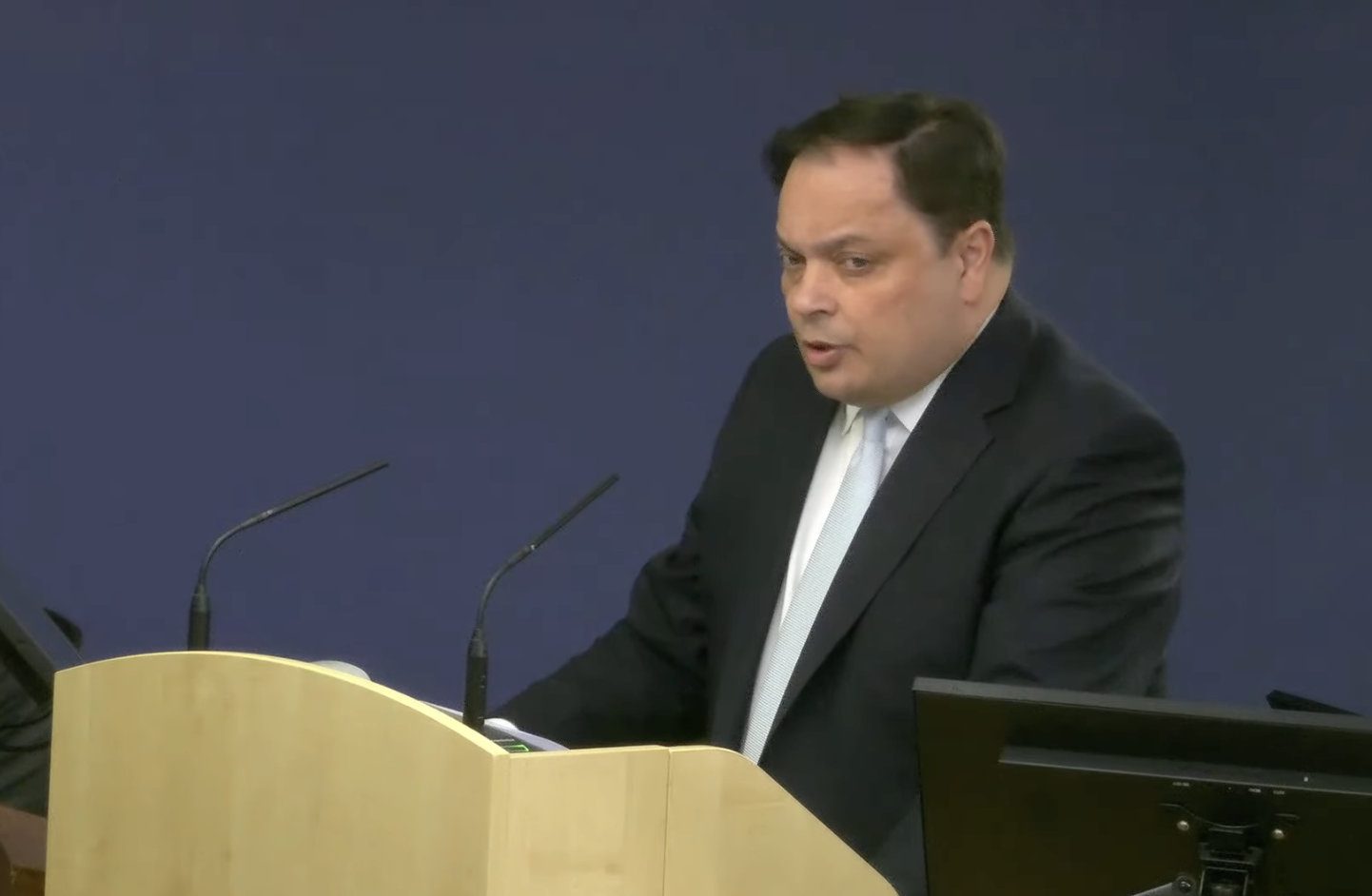
Graham Ward was the Post Office investigator who helped put former Subpostmaster Noel Thomas away. Whether he did so by perverting the course of justice is something the Metropolitan Police (his current employer) will be looking at very closely, after today’s evidence session. The Metropolitan Police are core participants to the Inquiry.
Mr Ward was called back to the Inquiry after his first evidence session on 1 Feb this year. During that evidence session he was taken by Jason Beer KC to various emails surrounding a witness statement drafted in late 2005 by Fujitsu engineer Gareth Jenkins which was going to be used as part of the Post Office’s prosecution case against Noel Thomas.
Jenkins had written in his statement that a zero value transaction (an issue being raised as evidence of Horizon error by Mr Thomas) could be caused by one of three things, the third one being “there has been some sort of system failure – such failures are normal occurrences”.
Graham Ward did not like this. He told his colleagues it was “potentially very damaging”.
Beer took him to a marked-up version of Jenkins’ witness statement sent in an email by Ward back to the Fujitsu team. By now it was early 2006. In the body of the email Ward had written that it was “important” to get the attached witness statement right “and ensure that we’re not embarrassed at court, we certainly could be if we produce the statement accepting ‘system failures are normal occurrences’ end quote’.”
The witness statement attached to Ward’s had been marked up. This version had struck through there has been some sort of system failure – such failures are normal occurrences with a comment attached to the strikethrough. It read: “This is a really poor choice of words which seems to accept that failures in the system are normal and therefore may well support the Postmasters’ claim that the system is to blame for losses!!!!”
It appears someone was trying to doctor a statement of truth, by an expert witness, to be used in the criminal prosecution of a Subpostmaster.
Earlier this year Ward told Beer the deletion had nothing to do with him.
“I would not have typed over anything or deleted anything at all”, he said. “I just know the person that I am and
I wouldn’t have done that.”
Beer pointed out this was on a document he had sent via email. Ward conceded a little ground.
“Well, I’m sure I’ve… I must have typed the words, yeah. But I wouldn’t have typed over “system failure”.
But reader, he did
Ward was called back to the Inquiry today. Since his evidence on 1 Feb, the Inquiry team had found the source Word document of Gareth Jenkins’ witness statement which was being batted back and forth between Ward and Fujitsu. The Word document had tracked changes. All the changes to the document had been made from Graham Ward’s work account. Beer demonstrated this to him on the Inquiry’s document software screens.
JB: So over the course of 52 minutes, and if we just scroll down and hover, again, over each amendment, we can see that they’re all made by you. OK?
GW: Yep.
JB: If we scroll to the second page, and just pick any amendment, please, operator, at random, and then the one in the middle. Thank you, and then the middle of the page, and then do one at the bottom of the page, and then over the page, yes, all the amendments made by you. So these were all made by you, Graham Ward. This isn’t a case of somebody else surreptitiously logging into your system and pretending to be you, these were amendments made by you.
GW: That’s correct, yes.

Beer took him to the reasons for a zero value transaction.
“One, the transaction has no financial effect, ie a balance inquiry or a pin change. Two, the transaction has been declined by the bank, and then three, there has been some sort of system failure, such failures are normal occurrences… If we hover above those, you deleted those words, didn’t you?”
Ward replied: “Well, yeah, I mean, I’ve obviously put a line through it, but as I said at the outset, what I was doing here was reviewing this statement. My intention was not to insist on anything being put in or removed. I’m just reviewing it as I was asked to do.”
“In what way”, Beer wondered, “is reviewing a statement consistent with putting a line through something and deleting it?”
Ward could not explain his actions, but insisted his intention “was absolutely not to have anything deleted from that statement that Mr Jenkins wasn’t happy with at all. I was just trying to help him and to review a statement.”
Mr Ward (who was read the self-incrimination warning by the Inquiry chair again this morning) is clearly alive to the fact that a criminal act usually requires criminal intent.
Beer gently steered him back on course. “Let’s put aside the intention issue for the moment, Mr Ward. On the last occasion, you denied deleting the third reason. You said “it’s just not me, I know the type of person I am”. Do you agree that in fact you did delete that third explanation from Mr Jenkins’ witness statement?”
“I can see that now, yes” replied Ward.
Beer raised Ward’s comment after the deletion. “This is a really poor choice of words which seems to accept that failures in the system are normal and therefore may well support the postmaster’s claim that the system is to blame for the losses!!!”
“Do you agree”, he asked, “that that discloses your motive for deleting the third explanation?”
“No, I don’t agree with that”, replied Ward. “I’m just reviewing the statement.” Though he admitted he could “see how it looks now.”
Beer asked: “Do you accept that by your conduct you caused to be removed material information from Mr Jenkins’ witness statement at the time that a prosecution was afoot against Mr Thomas?”
Ward did not agree. In fact, he blamed Jenkins for its removal stating that by deleting the comment for reasons he accepted were “potentially very damaging” was simply an innocent search for “more context”.
Beer wondered why Ward did therefore not send an email to Gareth Jenkins saying “‘Can I have some more context please on what system failures are?’ Rather than deleting system failures from the witness statement and saying three times, ‘We need to delete this because it’s damaging, it’s potentially embarrassing, and it would assist the on Postmaster’s defence?’”
Ward could not really, sensibly respond. Beer wondered if it might be “a desire that the Post Office was not embarrassed at court by revealing that Horizon had defects: system errors”.
Ward denied it. He said he was not trying “to cover anything up” especially evidence of bugs in the system, because he was “unaware that there were bugs, errors and defects in the Horizon system” in the first place.
Beer pointed out Gareth Jenkins, in his draft witness statement was telling him there were “defects in the system, in his witness statement, and you were deleting that information. He said there were system failures, and you wanted that deleted?”
“I didn’t want to delete it, no.” said Ward
“In what sense is striking through a sentencing sentence in track changes and providing three explanations why that should be removed not a case of deletion?” asked Beer.
“I can see how it looks”, admitted Ward again, “but I can assure you my intention was not for that to be deleted.”
I suspect in due course, Mr Ward might have to explain his lack of intent once more, in a criminal court, and a jury can choose to believe him or not.
The journalism on this blog is crowdfunded. If you would like to join the “secret email” newsletter, please consider making a one-off donation. The money is used to keep the contents of this website free. You will receive irregular, but informative email updates about the Post Office Horizon IT scandal.

Leave a Reply